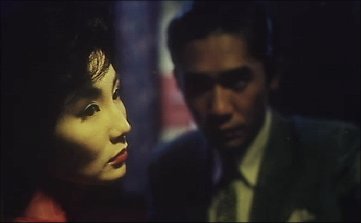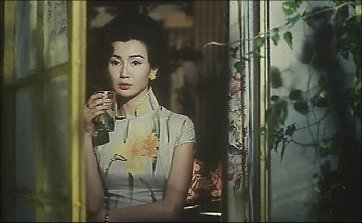|
Text and layout © Ed Shum, 2003. Ed Shum asserts the moral right to be identified as the author of this work |
|
Long Reviews |
|
Review of In The Mood For Love (2000) |
|
|
|
...Continued... [Page 2] |
|
End |
|
For once, instead of merely empowering and yet paralysing us with the force of the longing, loss and pain felt by the characters, leaving us with but an open ending of empathy and hope, in ITMFL we are invited to feel the longing to such a degree that we complete the narrative’s gaps to bring the lovers together in our minds, in a move towards subjective film-making where the viewer is no longer mere passive recipient of auteur vision, but emotional participant in the realisation of the film’s completeness. It is no surprise that the few reviewers who weren’t enamoured by the movie (and, as ever, it won’t be to everyone’s taste), felt it to be somehow hollow, incomplete, or unfulfilled. The movie demands participation. It is not that the film has to be completed as such, but the power of the possibility of love fulfilled is somehow presented as more compelling than actual gratification, more engaging to empathy. Though both performances are powerhouse in accuracy and appropriateness (and Maggie’s is emotionally strong enough to hurt at times), the depictions, too, are given gaps and questions marking the tacit but inexorable invitation for the audience not just to think, or even feel, but to create. As previously mentioned, this is something of a departure for WKW, or rather a further development at any rate. Other WKW films invite the unconditional sharing in experiencing the depiction of a subjective consciousness - rich enough to pull the viewer out of the objective standpoint of the self (objective, that is, to the movie). Here, ITMFL invites not just the sharing of the experience by the viewer, but the emotional force of the viewer in completing the experience. Yet the viewer does this, again, without importing the self as a standpoint - one feels the film’s subjective consciousness without even realising that the viewer has been privy to ‘creating’ such consciousness. Eventual realisation that the keystone of the experience of the movie actually may lie in the viewer’s emotion comes as something of an epiphany. |
|
The unique emotional participation given to the viewer is not without limits though. This being WKW, what would longing be without loss. In order for us to conclude the possibilities of the centre of the film, the end requires the protagonists to be in such a state for us to speculate on what could have or may have been. The end marks separation, not just of two persons from each other, but of two persons and a past, now behind a ‘window’ of memory, a secret sealed by whispering it into history, separation for entire peoples, too, from an era over, moving into the past (the allusion to the chaos of the Cultural Revolution, the footage of Charles De Gaulle visiting his fading empire in Cambodia). This may also be a tacit hint at WKW’s view of film-making: he has been on record as saying that he treats every film as his last - perhaps he too is facing a new future and change - a new era in his art. |
|
A room with a view: Maggie Cheung’s performance is one of her best. Hugely evocative, she brings to us the force of longing via multi-layered introspection which manages to be both subtle and expressive. What is more, the movie does not force us to swallow the perceived feelings of the characters as absolutes: in the end, we rely on our own personal interpretations |
|
At times though, the extensions and retractions of narrative become such that, in any other director’s hands, the result would be unforgivable. WKW is famed (and notorious) for his experimental mannerism, but on first viewing ITMFL appears more restrained, more subtle. However, this hasn’t stopped several scenes developing into non-chronological, non-causal meta-narrative. Consider when Maggie visits Tony’s ‘outside’ room (room 2046, a reference to his next film) after being called by him. It is not even clear whether she has been there before, but the scene mixes footage of her storming upstairs to his room in haste with footage of her storming down in an apparent change of heart. The moment is suspended in expectation whilst we see Tony waiting in his room. Eventually the potentiality is resolved when we hear her knock on his door - yet, apart from being an exercise in manipulating viewer expectation, WKW gives no excuse for toying with the fabric of the narrative structure. This is unforgivable and practically unworkable for most film-makers, but WKW seems to give his storytelling technique such a literary bent that the move is workable, giving the tale just the right pitch of unreality. Subsequent scenes, however, do require some thought before they even make sense - and, despite the apparently laid back pace, the film leaves little ‘absorption time’ for viewers to grasp concepts; you even occasionally wish that the film was slower! Despite this, the film still ‘works’ even without close analysis and full understanding of the narrative - we can feel what the characters feel even if a moment is more a conceptual extension of narrative than ‘real’ fact. This also makes the movie incredibly rewarding on further viewing. For example, consider the confusing separation - the missed call to Maggie’s office, Tony’s voice-over (it’s actually a phone call, albeit unseen, so it’s the closest thing the film has to a voice-over), Tony leaving room 2046 at night, Maggie sitting there distraught at day, her identical unseen call. To piece this together in watertight fashion is an achievement which still eludes me - but the effect of the scene still persists. When we hear Tony’s question, we await a reply or response: this is delayed. We read both characters for a sign. Maggie’s eventual response (if it is a response) has the effect of finalising our expectation of the separation - albeit without resolving any ambiguities. |
|
And so the narrative lurches to its extended epilogues. ‘Lurch’ is the right word, and the movie makes no excuse for the sudden changes - the purpose can be seen as to transpose the film’s themes into a different context, or for the sake of visual/textural contrast (so says WKW regarding the final Angkor Wat coda). Yet some viewers were disappointed, as many questions were left unanswered - narrative closure not being WKW’s priority. Even here, the film plays with our expectations of some hidden turnaround, some connection which we will to occur. We get Maggie sneaking into Tony’s Singapore apartment - it was only later that parallels to Faye Wong in Chungking sprang to mind for me, this scene being so different in tone and effect. Maggie appears to haunt his memory, leaving clues behind, crank-calling his office. In this call we see her stay silent, the receiver aside, then the receiver appears to moves to her mouth... and the shot cuts to her hanging up. The final Hong Kong sequence makes it appear as though both return to their old apartments near-simultaneously - yet Tony actually arrives some time later when Rebecca Pan’s Shanghainese landlady has already moved out and Maggie has moved in - and we are also made to question whether Maggie’s son is Tony’s, or where her husband has gone. But rather than indulge the audience’s curiosities, Tony walks on out of the scene, into the Angkor Wat coda to whisper his ‘secret’ and end the story. |
|
Page: |
|
Page: |
|
Belle du jour: WKW mixes up scenes of reality, such that some have a profoundly unreal slant, brought about by usage of colour, almost fetishistic slow motion and music. This results in the subjective evocation of consciousness. But then, WKW blurs the line by asking us when such scenes step beyond ‘re-imagination’ of reality, and into unreality - and whether this distinction even matters |

